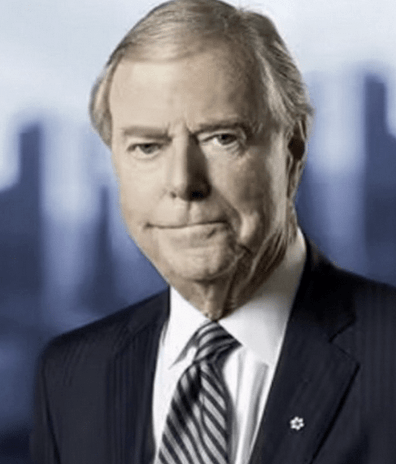Beyond ‘Axe the Tax’: Where’s the Poilievre Plan?

By Don Newman
January 15, 2025
The conventional wisdom in Ottawa these days is that Justin Trudeau’s imminent departure as prime minister and leader of the Liberal Party has left Canada in a difficult position as Donald Trump gets ready for his second term as President of the United States. In fact, the opposite may be true.
Trudeau’s departure is an opportunity for Canada to both challenge Trump and start addressing problems that have bedevilled the country for decades and which are now coming home to roost. With Trudeau’s exit, the country has an opportunity to turn the page, to resuscitate an economy that has been slowly declining, to develop an agenda for growth, and to play a more dynamic role in an ever-more dangerous geopolitical environment.
That opportunity begins with the official start of the race to pick a new Liberal leader. But it is not confined to Liberals. Almost immediately after that leader is chosen, the country will be in an election campaign. It is time for the other parties to be ready to unveil what plans they have for Canada going forward.
Parties in opposition always argue that to reveal their policy positions before an election allows their opponents to steal them. That is what Pierre Poilievre and the Conservatives have been saying for the past two years. But with a 20-point lead in the polls and an election imminent, the party should be giving us a plan to deal with Trump, plans to tackle the defence spending debacle and plans to spur economic growth. Repeating “Axe the Tax” and a few other rhyming slogans doesn’t cut it any longer.
This is an opportunity for the Conservatives. Canadians are tired of the Liberals, tired of their policies, from the carbon tax to immigration to spending to the woke-ism that may have begun as progressivism packaged for social media consumption but which has backfired to the detriment of its original aims.
The challenge for the Liberal candidates to replace Trudeau is that most have been members of the government that espoused those policies. Maybe that is why prominent cabinet members such as Finance Minister Dominic Leblanc and Foreign Affairs Minister Mélanie Joly decided to sit out the leadership race.
In the past two years, Poilievre and the Conservatives have gone a long way in attacking those policies as they have become increasingly unpopular — and in the process making them even more unpopular. But now is the time to reveal what policies they will pursue if they hold office, not just those of the previous government they plan to cancel officially after having “cancelled” them politically.
So far, on the Trump file, the Conservatives have been missing in action. Other than joining everyone else in saying that the incoming president’s farcical call to make Canada his country’s 51st state is ridiculous, their leader has been invisible. In more normal times, with their current lead in the polls, Poilievre and his team might have just waited for the election to fall into their laps.
Poilievre wants the election to be fought on the federal carbon tax — a hobby horse he has ridden with great success. But this is not going to be a carbon-tax election. This is going to be a Trump-tariff election.
But these are not normal times. Waiting for the law of gravity to produce a Conservative government could be a mistake if the race for the Liberal leadership produces a winner who has captured the imagination of at least some of the voting public.
The leadership race will start just as the Trump administration takes office. If Trump makes good on his pledge to impose 25% across-the-board tariffs on all Canadian exports to the United States, every political leader — federal and provincial — will have to join the fight with their ideas, their commitment and support.
The meeting between Conservative Ontario Premier Doug Ford and Liberal federal Finance and Intergovernmental Affairs Minister Dominic Leblanc on Tuesday — after which the former was effusive about both Leblanc and the “phenomenal” federal plan to deal with Trump and the latter complimented Ford’s Council of the Federation chairmanship — was an excellent example.
Recently, former Conservative Prime Minister Stephen Harper joined the battle. He went on an American podcast and pushed back against Trump’s statements on defence, dairy supply-management policy, cross-border crime, drugs at the border, defence spending, and oil and gas exports. On the last item, Harper said rather than Trump’s claim that the United States is subsidizing Canada, the reverse is true.
The Canadian trade surplus that Trump rails against is due to the Canadian oil bought by the United States, Harper pointed out, reminding the audience that oil is sold at a discount below the world price of oil. That means, he said, Canada is subsidizing the United States.
The current Conservative leader has to join the debate. Poilievre wants the election to be fought on the federal carbon tax — a hobby horse he has ridden with great success. But this is not going to be a carbon-tax election. This is going to be a Trump-tariff election.
As it happens, the two early front-runners for the Liberal leadership — one a former Financial Times editor and finance minister who negotiated a bilateral trade deal during Trump I, the other a former governor of not one but two G7 central banks — are steeped in matters of not just economics but trade, including tariffs.
If Poilievre wants to prove that he’s not only not intimidated by Donald Trump, but not intimidated by Chrystia Freeland and Mark Carney, he’ll have to step up to the existential challenge facing the country and tell us all what he plans to do.
Contributing Writer and columnist Don Newman, an Officer of the Order of Canada and lifetime member of the Parliamentary Press Gallery, is Executive Vice President of Rubicon Strategy, based in Ottawa.
